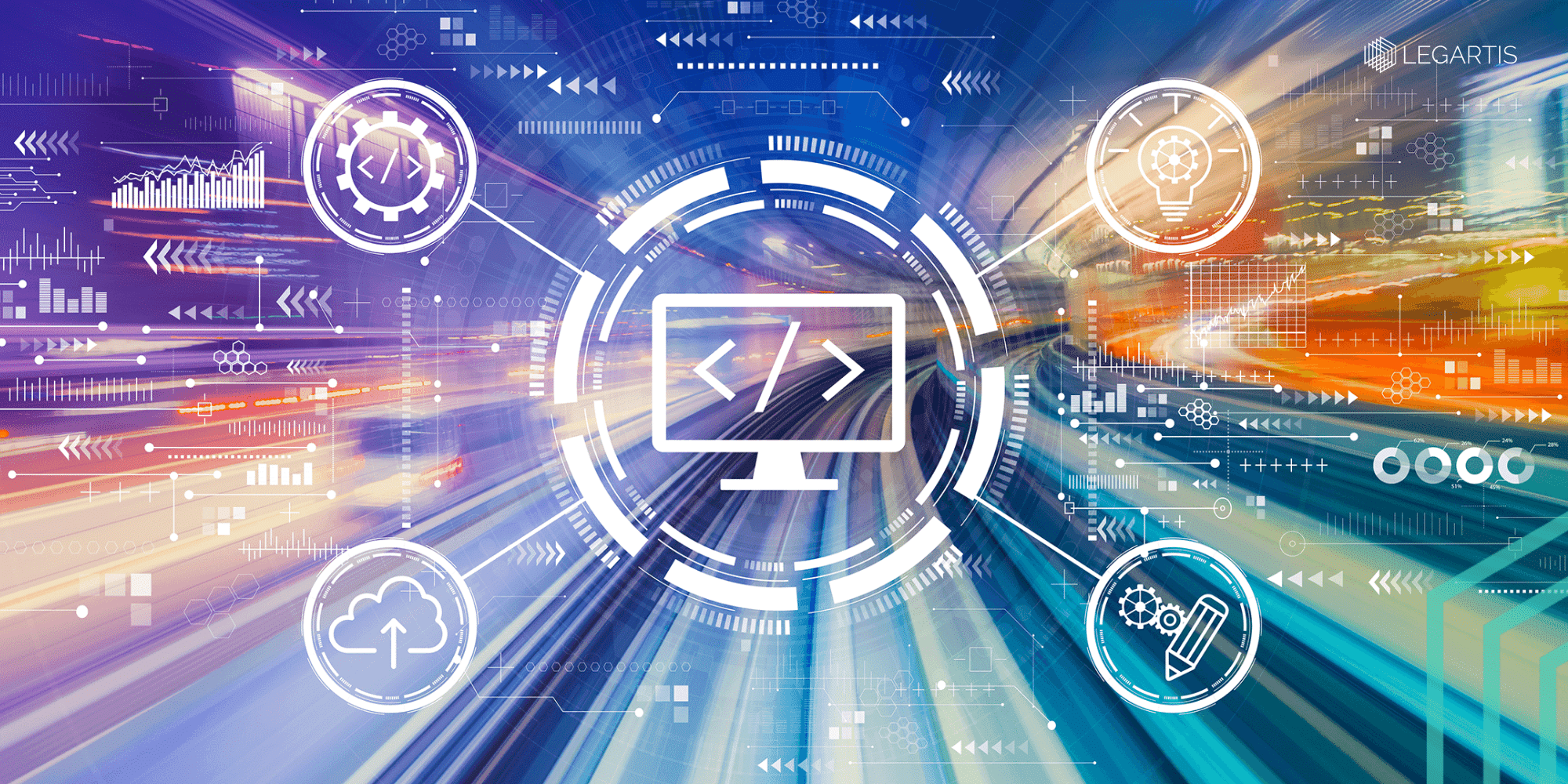Experts estimate the market for legal technology, or legal tech for short, to have reached 13 billion US dollars in 2021 and expect explosive growth in the next five years. More and more companies and law firms are realising it’s better to jump on the legal tech bandwagon now, before their competition does it first. But what exactly is behind the buzzword “legal tech”? Here’s an overview.
Legal Tech Definition
The question, "what is legal tech?" has many different answers – and each is correct in its own way. After all, there is no uniform definition of legal technology across professional circles. The consensus on what is included under the umbrella term has evolved in recent years, in parallel with technological progress.
Initially, the term legal tech was used to describe applications that digitise administrative processes in everyday legal work and make them more efficient. During the course of the 2010s, new types of legal technology came onto the market; software that could also support core legal tasks, such as the assessment of cases and the evaluation of contracts. Today, some assessments can even be automated fully.
To establish a common understanding on this topic, we will use the following comprehensive definition of legal tech:
Legal tech describes digital applications and systems that facilitate legal services and make them accessible to a larger group of people.
Types of legal tech: What are the differences between applications?
The general definition of legal technology is likely to be met with widespread agreement. However, opinions start to diverge when discussing how to distinguish between the different types of legal tech. We present some of the best known classifications below.
The BCG Legal Technology Framework
A study by Harvard Business School and Boston Consulting Group (BCG) has analysed the legal tech market and its impact on the legal profession. These experts distinguish between three types of legal tech.
- Enablers: Legal technology supports the essential digitalisation of business processes in law firms and legal departments. These include technologies used across all sectors, such as cloud storage and IT security applications, as well as sector-specific platforms such as ones used in project management.
- Legal tech for process optimisation: These applications not only digitise previously paper-based work tasks, but also improve the efficiency of processes that are not of pure legal nature. The applications support HR in recruiting, for example, so that vacancies can be filled more quickly, or automate processing steps in accounting and controlling that work to adjust business strategy. Most companies use this type of legal tech, to some extent.
- Legal applications: Digital applications that affect the core of legal work are the third and most recent type of legal tech. They support lawyers in very different ways: for example, the applications can take over the creation of draft contracts, automatically check whether contracts contain problematic clauses or analyse past court rulings in order to assess the chances of clients obtaining justice in court.

The Stanford Legal Codex Database Framework
CodeX, the Centre for Legal Informatics at Stanford University, has been keeping a list of companies that are "changing the way lawyers work" since 2015. The CodeX Tech Index classifies legal tech companies into nine categories:
- Marketplace: This category covers everything within job platforms for legal professionals, platforms where clients can find lawyers, and marketplaces where legal departments and law firms can find services for their activities.
- Document Automation: Covers applications that structure and automate document management in legal departments and law firms.
- Practice Management: Covers companies that offer digital services for the daily work in law firms and legal departments that does not relate to core legal activity. Examples: taxi services for lawyers or mail delivery for law firms.
- Legal Research: Includes companies whose applications simplify or automate research on legal topics.
- Legal Education: Includes companies that support students, lawyers and other interested parties in studying legal content.
- Online Dispute Resolution: Covers companies that offer digital solutions through which parties in conflict can resolve their legal disputes with each other. These platforms are mostly used for mediation.
- E-Discovery: Covers providers of software that help lawyers search for specific data and find trends or anomalies in large quantities of data.
- Analytics: Covers companies whose technology intelligently evaluates data and in this way generates better and more efficient insights. This can involve analyses in the non-legal area of a company or core legal tasks, such as the evaluation of court rulings or the search for precedents.
- Compliance: Covers providers of software that uncover compliance risks, specifically from legal tech companies.

5-point scale for assessing the value of legal technology
Many of the categories above, as suggested by CodeX, are similar, but Zach Abramowitz takes a significantly different approach to classifying legal tech. The legal tech investor awards points depending on the characteristics of a legal tech application. The more points, the more profound the influence of the application on core legal activity and the greater the benefit for the company using it.
This is how the points are awarded:
- 1 point if the application simplifies the work of lawyers more effectively than previous methods
- 1 point if the technology can perform the legal work independently
- 1 point if the majority of buyers of the software are law firms and/or corporate legal departments
- 1 point if the application has been developed specifically for lawyers and/or legal departments
- 1 point if the software can influence the outcome of a dispute or negotiation
The multitude of classification methods for legal technology have one thing in common: they show how versatile the fields of application of the technology are. Therefore, accordingly, the economic potential for companies and law firms is great if they use legal tech in one or more business areas.
The most important advantages of legal tech for companies
The key advantages of most legal tech applications can be summarised in three main points:
1. Saving Time
Digital legal tech applications standardise processes and slash processing time, as the right follow-up activities can now be triggered automatically with just a few clicks. In fact, applications that use machine learning and artificial intelligence can already support lawyers in their legal assessment. Not only do they assess tasks in a fraction of the time it takes a human to do so, but they may also give non-lawyers the tools to make legal assessments.
2. Improving Quality
Technology doesn’t tire. Legal tech is one of the most effective ways to ensure quality. Deadlines are no longer missed, formalities are reliably adhered to, and there are no more careless mistakes in legal assessments. And while people have to work for years to develop their legal judgement, a trained AI, for example, can make quick high-quality assessments.
3. Simplifying access to legal knowledge
Legal tech opens the doors to greater efficiency and productivity for companies. Contracts between business partners and customers could previously only be competently reviewed by the legal department, but today, the use of artificial intelligence accelerates the contract review process and enables departmental staff to review contracts independently. This means that more and more responsibilities can be returned to the specialist departments and the project managers. This increases legal expertise in a company while at the same time relieving the legal department. Greater independence from the legal department leads to accelerated contract conclusions within other departments – all to the benefit of the company's growth.
Legal Tech Overview: 3 Key Takeaways
The definitions and categorisations of legal tech are as varied as its areas of application. According to market research by Gartner, spending on legal tech will triple by 2025. Up to 50 percent of tasks in legal departments will then be automated.
- Legal tech applications are breaking through to ever new areas of the legal working world – and so are artificial intelligence applications with high-quality analysis features. This digitalisation simplifies or accelerates processes throughout the contract lifecycle.
- Legal tech is changing the job description of a lawyer. They will return to filling a more advisory role, giving them more time to develop new solutions that help shape and develop the company.
- No company can do without legal tech any more. The applications are so powerful and the commercial opportunities too great for companies and law firms to ignore.
Many legal departments hesitate to introduce legal tech because they lack the technological skills for it – and there is certainly a need to catch up with the developing tech in the coming years. But as with any technology project, it’s important to gain experience and start with small steps. For this, processes that are often repeated and involve a lot of repetitive, manual work are a great place to dive in.
Get started on your first legal tech project and automate contract review. Would you like to learn more? Get in touch with us.
Recommended Articles
Reviewing NDAs in Companies: Why Standard Templates Are Risky
Non-disclosure agreements (NDAs) are among the most frequently used contracts in organisations. They are signed every day – between Sales and potential clients, between HR and..
Contract Reviews with ChatGPT? Chances, Risks, Alternatives
A contract is uploaded or pasted into the interface. ChatGPT is asked to highlight risks, explain clauses or provide recommendations. The motivation behind this is..
Agentic Legal AI: When AI Shifts from Assistant to Actor
The days when AI in the legal industry was little more than a glorified spell checker are over. What sounded like science fiction just a few years ago is now reality: Agentic..




